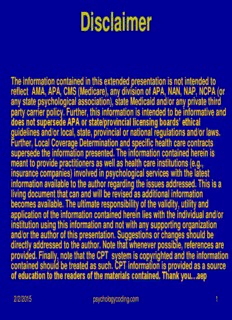
Medicare, CPT, RVU: Update, Problems, & Directions PDF
Preview Medicare, CPT, RVU: Update, Problems, & Directions
Disclaimer The information contained in this extended presentation is not intended to reflect AMA, APA, CMS (Medicare), any division of APA, NAN, NAP, NCPA (or any state psychological association), state Medicaid and/or any private third party carrier policy. Further, this information is intended to be informative and does not supersede APA or state/provincial licensing boards’ ethical guidelines and/or local, state, provincial or national regulations and/or laws. Further, Local Coverage Determination and specific health care contracts supersede the information presented. The information contained herein is meant to provide practitioners as well as health care institutions (e.g., insurance companies) involved in psychological services with the latest information available to the author regarding the issues addressed. This is a living document that can and will be revised as additional information becomes available. The ultimate responsibility of the validity, utility and application of the information contained herein lies with the individual and/or institution using this information and not with any supporting organization and/or the author of this presentation. Suggestions or changes should be directly addressed to the author. Note that whenever possible, references are provided. Finally, note that the CPT system is copyrighted and the information contained should be treated as such. CPT information is provided as a source of education to the readers of the materials contained. Thank you…aep 2/2/2015 psychologycoding.com 1 Acknowledgments: Organizations North Carolina Psychological Association (NCPA) American Psychological Association (APA) Practice Directorate (PD); Ethics Committee American Medical Association (AMA) CPT Staff National Academy of Neuropsychology (NAN) Division of Clinical Neuropsychology of APA (40) Center for Medicare & Medicaid Services (CMS) Medical Policy Staff- Medicare National Academies of Practice (NAP) (presented in chronological order of engagement of support for the work outlined) 2/2/2015 psychologycoding.com 2 Acknowledgments: Individuals • AMA: Marie Mindenman, Tracy Gordy, Peter Hollman • APA: Randy Phelps, Norman Anderson, Katherine Nordal (APA Testing as well as Psychotherapy Groups) • NAN: PAIC Former and Present Committee • NAP: Marie DiCowden • Other: James Georgoulakis, Neil Pliskin, Pat DeLeon • (highly instrumental in recent CPT activities) 2/2/2015 psychologycoding.com 3 Support Provided • AMA = AMA pays travel and lodging for AMA CPT activities 2009-present (no salary, stipend and/or honorarium; stringent conflict of interest and confidentiality guidelines) • APA = Expenses paid for travel (airfare & lodging) associated with past CPT activities (no salary, stipend and/or honorarium historically nor at present) • NAN = (from PAIO budget) Supported UNCW activities (no salary/honorarium obtained from stipend/paid to the university directly; conflict of interest guidelines adhered to) from 2002-2009 • UNCW = University salary & time away from university duties (e.g., teaching) plus incidental support such as copying, mailing, telephone calls, and secretarial/limited work-study student assistance • Stipends = 100% goes to the UNCW Department of Psychology to fund training of students in neuropsychology Summary = AMA CPT includes travel/lodging support but no salary/stipend. Any monies obtained, such as honoraria for presentations, are diverted to the UNCW Department of Psychology for graduate psychology student training. No funds are used to supplement the salary or income of AEP. 2/2/2015 psychologycoding.com 4 Personal Background (1988 – present) North Carolina Psychological Association (e) NAN’s Professional Affairs & Information Committee (a); Division 40 Practice Committee (a) National Academy of Practice (e) APA’s Policy & Planning Board; Div. 40; Committee for Psychological Tests & Assessments (e); Ethics Committee Consultant with the North Carolina Medicaid Office; North Carolina Blue Cross/Blue Shield (a) Health Care Finance Administration’s Working Group for Mental Health Policy (a) Center for Medicare/Medicaid Services’ Medicare Coverage Advisory Committee (fa) American Medical Association’s Current Procedural Terminology Committee Advisory Panel – HCPAC (IV/V) (a) American Medical Association’s Current Procedural Terminology – Editorial Panel (e; rotating and permanent seat/second term) Joint Committee for Standards for Educational and Psychological Tests (a) 2/2/2015 psychologycoding.com 5 legend; a = appointment, fa = federal appointment, e = election; italics implies current appointment/elected position Standards & Guidelines for the Practice of Psychology • APA Ethics Code (2002) • HIPAA and other federal regulations • State or Province License Regulations • Contractual Agreements with Third Parties • Professional Standards (e.g., Standards for Educational and Psychological Tests, 1999; in revision) 2/2/2015 psychologycoding.com 6 Primary Goals & General Outcomes • Goal (since 1988) – Parity with Physicians – Expansion of Scope of Services Reflective of Science and Practice • Outcome (presently) – Intended/Anticipated/Hoped • Similar reimbursement as physician services • General increase in the scope of practice • Greater inclusion into health care system – Less Anticipated • Transparency • Increased Accountability • Uniformity • Potential impact on certain practice patterns • Constant change • Shift from national to local fronts 2/2/2015 psychologycoding.com 7 Why This Information is Important? • Medicare Cuts • Health Care Law Which Will Change Health Care (largest change in 25-50 years) • An Entirely New Diagnostic System Will be in Place Next Year 2/2/2015 psychologycoding.com 8 Outline • Part I: Coding, Billing & Documentation • Part II: Economics • Part III: Challenges & Solutions • Part IV: Resources 2/2/2015 psychologycoding.com 9 Part I: Coding, Billing & Documentation • Part I: – A. Medicare – B. Current Procedural Terminology – C. Diagnosing – D. Medical Necessity – E. Documentation – F. Time – G. Location of Service – H. Technicians – I. Supervision – J. Correct Coding Initiative 2/2/2015 psychologycoding.com 10
Description: